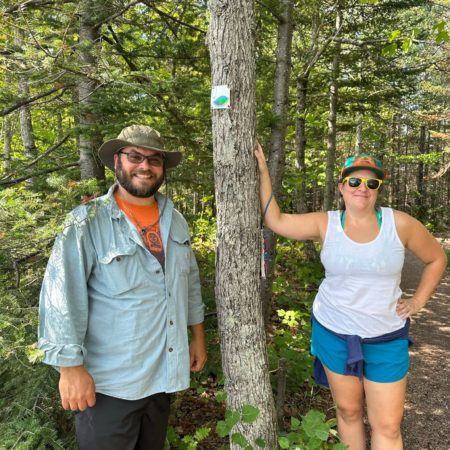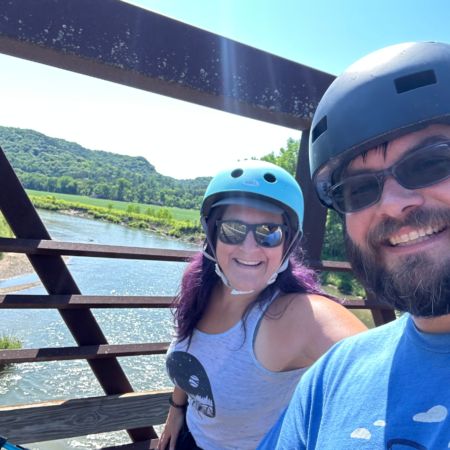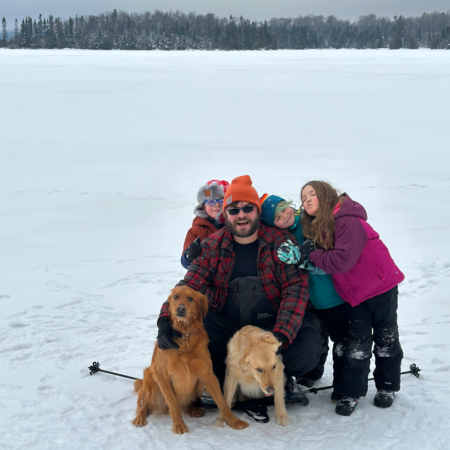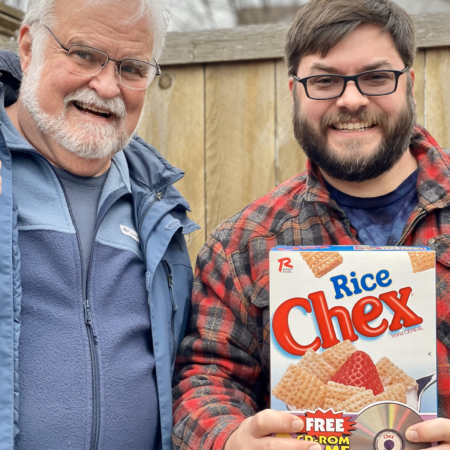Meet Dan Snyder: Attorney, Environmentalist, Father
Dan Snyder joined Public Justice in 2023 as a senior attorney for the Environmental Enforcement Project. He is now the Director of the Environmental Enforcement Project.
Dan has been practicing public interest environmental law since he graduated from University of Oregon Law School. He represents the interests of individuals, local grassroots organizations, and national non-profits while enforcing our nation’s environmental laws against polluters.
Nikki: How did you get into this field of work? And what radicalized you to participate in environmental law?
Dan: I tell people this, and I don’t mean it to sound weird or like I’m puffing my chest or anything, but I decided to go to law school, because I wanted to save the world. As an undergraduate, I could see how many things needed to be changed, and I was exposed to so many problems, and also so many issues with our ability to address those problems. It is a system built upon capitalism and money that has brought us to the point we’re at, and I am not independently wealthy, unfortunately. But I was like, boy, it seems like for someone like me, the best way for me to affect change is to be a lawyer.
Public Justice is trying to give a voice to silenced people across the board, not just environmental matters, but on almost every conceivable thing you can come up with that’s a problem in our society today.
And it seemed like a reasonable course to take, especially because of the strong judicial branch we have here in the United States. I’m a big believer in the idea of equal protection under law. And I’m a big believer in the ability of people to use the court system to secure justice. Our problems, of course, are accessing the court system. That’s why I went into public interest law: because I can be the average person’s way of accessing the courts and achieving the change that we all want to see.
And you know, Nikki, let me say here your question says “radicalized” and I was a little offended by that, because I don’t think what I do is radical. When you talk to everyday people, and you tell them about the work I do, right? Like, I’m trying to prevent a species from going extinct. Or I’m trying to stop a huge polluting facility from making it so people can’t drink the water out of their well. Most people I talk to agree; people are shocked to learn that you can get a permit to pollute in the United States. And that it’s lawful! So I don’t think it’s radical what I do, I think it’s… righteous. I think most people would understand that our shared natural resources should not be parceled out to big corporations for extraction and abuse.
I put radicalized in there because and especially in environmental law specifically, it’s one of those things that I think that what you fight for is kind of like common sense rights that people should have access to clean air to breathe, and they should have good water that’s not going to harm them. Like these are like common sense things. But I think that they’re like the moment when I say radicalized you it’s that moment when, when did you first learn as maybe it was like, you know, pre-teen Dan, that was just like, “What? Wait, people… not everybody has access to clean drinking water or… Wait, it’s legal for them to dump their waste here because they have a permit?” Like, those are the moments that like radicalized or maybe awoke you to the fact that this could be a lane that you want to make change in.
“Enraged” might be the more appropriate term.

Right. But do you have that 11-year-old Dan was drinking dirty water and it was just like, “Oh no, this actually like this is a problem,” or do you have like a memory in your history that is where your journey—I know you want to save the world, but was there a smaller thing that got you on the bridge to saving the world?
I was raised by a good Minnesotan mom and dad that taught me it’s our obligation to help people. And to make sure that we preserve what’s here. My dad was big on getting me in the outdoors right away as a kid. That’s in my blood now. And so I don’t think I can point to a singular moment.
What do you think is the biggest challenge or the biggest reward you face doing this work?
Biggest challenge of all the work I do… My cases are often years long. And building that case is a lot of work, and it can be challenging. There are dozens of building blocks that have to be arranged just right for us to win. The defense has to knock out just one of those blocks for the entire structure to fall down sometimes. All the time and energy and really thinking about every facet of the case. I talk about being a competitor. And being a gamer; I don’t like to lose games, whatever game it might be, whether it’s a sports game, or a board game, or a video game. In a lot of ways, the cases that we do are like big strategy games, where your outcome is largely dependent upon how much foresight you have, and your ability to predict and understand what the future is going to bring.
So it requires a lot of attention to each little piece. And that’s a challenge, right? You can’t plan for everything, but you try to. The reward, of course, is the other side of that coin, when you win after years of work—that is a major reward. But the bigger reward is that it mattered. I won, and it mattered, something important happened. Especially again it’s winning for people that did not have a voice but for us.
Or had their voice taken away or silenced.
Yeah, oftentimes, if we don’t come in and offer up a way or solutions, these problems will continue. And I think that’s what makes Public Justice and the work we do so important. We’re trying to give a voice to silenced people across the board, not just environmental matters, but on almost every conceivable thing you can come up with that’s a problem in our society today. It’s humbling honestly.
For sure. Yeah, I think that the long game strategy, just as you said, it has that it’s got an enormous reward, but to be able to like, Okay, I’m going to scale this out for the next three years and find ways to set up my argument to be as unbreakable as possible. Well, you can’t. That’s very hard to do over a multi-year long game planning. So…
Yeah, it can be really hard to do. And certainly, there’s some reactivity that will occur, you can’t get around that, right? Something may happen, like an intervening change in law. But it’s still the challenge of being able to set all those pieces up so when the Court reviews your motion for summary judgment or hears your trial evidence, they see the final product that you’re putting on, they see the painting, or the bridge or whatever it is you want to build, they’re building blocks.

Do you have any specific case that stands out significantly in your career?
I thought about this one a little bit, because I’ve been involved in arguably some pretty big precedent-setting cases. The Cow Palace trio of cases that is widely discussed is the first time that RCRA (Resource Conservation and Recovery Act) was applied to cow manure, that’s a big deal. I think about that a lot. It’s a huge part of the work I do. Applying the Clean Water Act to moving coal trains, that’s arguably one of the things that got me a job interview here. And it took a huge amount of time—those two cases are seven years of my life. But the one that stands out to me, is the one that I think that really is a lesson in public interest work and, the tenacity that’s required to do it. And so, it’s story time with Dan.
In 2011, a developer owner of a piece of property in our fair little town, the City of Eugene with 150,000 people and sought to develop a planned urban development, or basically a subdivision in an area of pristine, untouched wildlife. It’s called the Amazon headwaters, and it’s in South Eugene. And it’s beautiful. It’s got old growth trees in it. It’s got a little stream that goes through it that forms a larger part of the Amazon Creek. One of my very first clients was the Southeastern Neighbors Community Association, which is like a City of Eugene neighborhood group. They wanted to retain me to oppose this development. And so of course, being the environmental lawyer, the first thing I did was went for a walk in it because it was still open to the public. And I was blown away at the beauty. I couldn’t imagine that somebody would want to turn this into, at the time, it was over 100 subdivision homes. And I don’t know the exact acreage off the top of my head, but I think 25 to 30 acres in size. You know, fairly large for a plot of untouched property within the urban growth boundary of Eugene.
Being able to physically touch trees that you saved—it’s almost surreal.
We had to undertake this long process of fighting to stop this development. And land use in Oregon is a very unique creature; there is a whole separate court system set up for it. We started out by going to this independent land use hearing official and fighting there. It’s essentially a mini trial to start out with. And we do that and spend a bunch of time preparing, and we lose. Yeah, we lost, so the subdivision gets approved. Now it gets approved with some modifications, which were good, but still, they’re going to cut trees down, they’re going to put homes in, they’re going to build roads, they’re going to change what is otherwise a really beautiful piece of land. Then we have to go to the planning commission, within the City of Eugene, and essentially put on the same case: put on a little mini trial, fight, fight, fight, and try to convince the commission that they should not approve this. Guess what? We lost. Crap. Okay. So that’s already almost two years, right there gone. Then we have to go to the specialized appellate court for land use decisions called the Land Use Board of Appeals. And you know what, we’re not going away.
So, we sued them in the Land Use Board of Appeals, challenging the City of Eugene’s approval. And, of course, the developers got involved as they always do, because they want to defend the decision. We had a Land Use Board of Appeals process that resulted in an oral argument. And, you know, it’s like an appeals court. And Nikki, we lost again! We lost. We did not win. Well, dang it, Dan’s undeterred. And my clients are undeterred. So, we take it to the Oregon Court of Appeals. The full Oregon Court of Appeals briefing process, that’s expensive. It’s a lot of work. Go up to Salem, do an oral argument in front of three judges. And wouldn’t you know, we lost again, like completely lost. We got what’s called “AWOP’ed,” which is affirmed without opinion, meaning the court thought that my appellate arguments were so weak that they didn’t even write an opinion on them. We lost, but this process took probably five years from start to completion, a long time. And it took a lot of money on the other side to constantly be defending this stuff. The community group was resolute, they were not going to give up, they were not going to compromise. My marching orders are very clear, you protect this, we fight every way. And when the bulldozers come, you go away Dan, and we’ll stand out there and we’ll protest.
By consistently fighting, by having the tenacity to not go away, by just saying, “We’re not going to let this happen,” we actually stopped the development. They ran out of money, and they ran out of time. Eventually we got together with the City of Eugene, and we bought the property from them. And it is now permanently enshrined as a park in the City of Eugene and shall not be developed. It’s called the Erin Noble Memorial Park after one of southeast neighbors’ most important supporters; her son Erin died in a tragic plane accident but had a lot of his formative years up there. Now every time I go to Eugene, you can be sure I go walk there. Being able to physically touch trees that you saved—it’s almost surreal.
I love that story. That’s a good case example. Thank you for sharing that. What is your go-to leisure activity? What do you do when you’re not at work?
I’m primarily parenting. You could call parenting part of leisure. I enjoy being a father. I enjoy taking my kids out and doing stuff. It’s very rewarding. But as a lifelong Minnesotan, I am an outdoors person, first and foremost. I spend a lot of time outdoors and a lot of time on the water, whether that’s in a boat or on the ice. I do a lot of fishing, a lot of boating, a lot of recreation of all sorts on the water. That’s very important to me. Which makes sense, being the Clean Water Act lawyer, right? I also am an avid disc golfer, I play at least two rounds of disc golf a week during the winter, and during the summer, sometimes seven or more. I’ve been doing that since I was 14. It’s one of my hobbies, I guess you could say it’s one of my sports. I take it far too seriously. But it’s fun, I have a great time doing it. Being an outdoors person, I love to go camping, whether that’s car camping, backpacking, under the stars, whatever it might be, which is also great for our dogs—we have two Golden Retrievers—to get them outside. We often hike to places where they can go off leash and go be themselves. Of course, I love watching my Oregon Ducks play, whether it’s basketball, football, whatever it might be, whatever I can find here in Minnesota.

What grassroots or movement building groups are you involved with that you want to get that you would like to see have more mainstream attention?
All of them. I’m not personally involved in any grassroot movement, grassroot, or movement building, outside of my professional career, because so much of my professional career is already involved in those movements. I already do so much more than I think the average American even considers doing. But you know, for me, and being an environmental lawyer for this long now, I’m really disheartened by our non-white communities having all the pollution concentrated in their communities. I try to say that as politically correct as possible, it used to be called the NIMBY problem, not in my backyard. Everywhere I go for my work, I am not in privileged, upper middle-class neighborhoods, as you could probably guess, I am instead in areas that most privileged white people will never see, they’ll never go there, they’re never going to see how the workers live at the big CAFOs and the types of homes they live in. They’re not going to see communities, like in Lambert’s point where it’s predominantly African American, where they’ve been dealing with coal dust for 100 years. You know, it’s part and parcel of what we do. If there’s a way that we can change that, it’ll be through the work that we do.
If you could change anything in the judicial or legislative branch, what would it be and why?
Well, I’ll step away from the judicial branch. I’ll say that if there’s one thing I think that would make the biggest difference in the United States, it would be to take money out of politics. If we could change campaign finance laws such that our representatives aren’t bought and sold by corporations with special interests, I think that would go a long way. Our politicians are not beholden to the people, most of the time. They’re beholden to who handles their campaign finance. If you look at politicians voting records, and then who’s giving them money, it’s pretty clear—you’re not even obfuscating the fact anymore, it’s just, it’s clear.
I would take money that we spent elsewhere in our government, at the federal and state level and put it all into public schools. Because I think that if we educate people a lot more, we could have much greater, relevant discourse in our society in a much more respectful way. And we could compromise again.
What is a fun fact about you that most people don’t know?
This is a good one. I had to think about this one for a second. But here’s my fun fact. In the 1990s, my dad’s company helped do advertising for multimedia corporations. And this was like Dot com, boom type stuff. My dad’s company was hired by General Mills. General Mills had a brand of cereal that used to be extremely popular but had slowly declined. Because kids didn’t like to eat Chex. It was that time when like, everything was sugar and marshmallows. Chex was trying to figure out, how do we get access to this younger generation? How do we get them to buy our cereal? So they came up with an idea: Well, why don’t we include a free video game in every box of Chex that you sell? So I participated in the creation of Chex Quest, which is the most popular video game cereal advertisement ever. The game is still played! I have this distinct memory of Little Dan sitting in this boardroom with all these official decision makers, and I was the target audience. They were asking me questions and stuff. And the problem was, General Mills didn’t want to do a video game that had guns killing people. I was sitting there, and I said, “Well, you know, you don’t have to have a gun to kill people. Maybe the gun is saving them.” My idea was that instead of having a gun kill ’em, maybe you’re transforming the monsters that you’re trying to kill back into what they originally were. You’re saving them. Wow, that’s that sounds pretty good actually. If you play Chex Quest, and you use the weapons, they’re not weapons, they are like transformer things. Apparently, I haven’t checked this in a long time, but my name is on like something like 100,000 of the very first CDs that were printed.

What is the best piece of career advice you’ve received?
The best piece of advice I ever got was from Tim Ream, who was our class of 2010 speaker in law school and one of my colleagues. Tim is super smart. And he was more experienced than all of us. He had had a life before law school, a life of protest and environmentalism. Tim told all of us that you need to follow your heart. If you follow your heart and what you want to do, the money will follow. But follow your heart. If you go chasing the money, you’re not going to be happy. And that is the best advice I’ve ever received. You know, I had opportunities in my life to change something that I was doing. And financially, probably substantially more advantageous than what I do now. But I said, no, I don’t really want to do that. Following your heart and what you want to do has, at least for me personally, resulted in great life satisfaction and career satisfaction. That’s not a thing many people can say.

